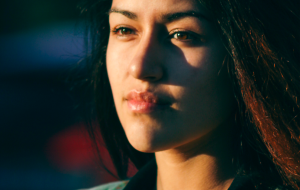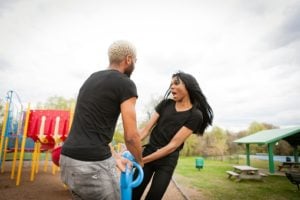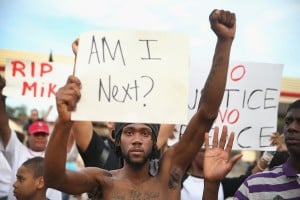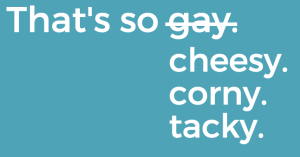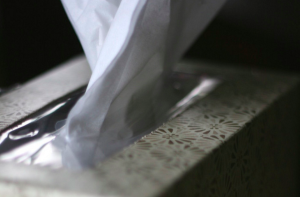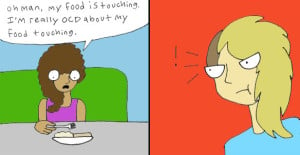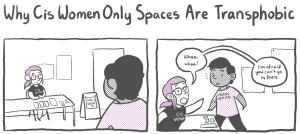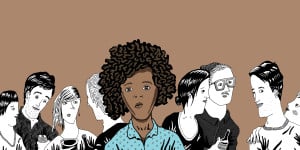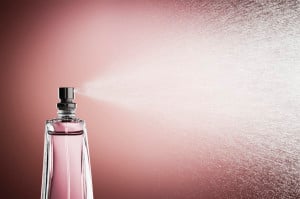I was at a presentation the other day, and the speaker made a comment that got my blood boiling.
They said, “Any Native person who identifies as lesbian, gay, bisexual, or transgender is just self-colonizing because they don’t know enough about their culture. Once they learn more, they will identify as Two Spirit.”
See any problems with that statement? Because I certainly do.
The language we use to describe ourselves is intricately tied to who we are, where we come from, and where we’re striving to go.
Two Spirit is an identity that resonates with a lot of Native LGBTQIA+ folks and holds some serious political weight. However, there are many layers that go into why someone who is Native and LGBTQIA+ might or might not choose to identify as Two Spirit.
First, I think it’s important to give you an idea of who I am and where I’m coming from. I’m a queer kanaka maoli woman. I’m Indigenous, I’m queer, and I do not claim Two Spirit identity.
I choose not to identify as Two Spirit for personal reasons and also because in my mind, the term Two Spirit is associated with Native peoples from the continent of North America – and as a kanaka maoli woman, that is not my history (more on this later!).
There are people who have my same identities who do identify as Two Spirit, which brings us to a good preface to the rest of this article: I am not speaking on behalf of all Native people. There are countless different opinions on this topic; these are just a few thoughts on good things to consider if you’re Indigenous and considering identifying as Two Spirit.
So Where Does the Term Two Spirit Come From?
Two Spirit as a label for LGBTQIA+ Native folks started gaining popularity in 1990.
Up until that time, (mostly White) anthropologists typically used the word berdache, which roughly translates to “kept boy,” to describe LGBTQIA+ Native folks.
The term was derogatory and excluded Native women and those that didn’t identify as men, so in 1990, an Indigenous lesbian and gay gathering chose the phrase Two Spirit as a uniting identity to replace berdache.
Two Spirit literally describes having both a masculine and feminine spirit housed in a single body. It also acknowledges that Two Spirit folks in pre-contact tribes were often respected and influential members of the community.
Two Spirit is an umbrella term in some ways, since many tribes have words in their own language to describe LGBTQIA+ or gender-variant community members. Someone might say they identify as Two Spirit and also claim their tribal-specific identity.
But Wait—Does Two Spirit Refer to Gender or Sexual Orientation?
This one can get confusing depending on who you’re talking to.
I’ve met folks who say that Two Spirit is only descriptive of gender based on the literal meaning of the term. Some folks have also made the case that tribes had language describing multiple genders, but not necessarily language describing different sexual orientations.
This is tricky since many tribes experienced language decline as a result of colonization, so it’s nearly impossible to know now whether a community might have had those words or phrases at some point.
That said, taking all of the above into consideration, some Native folks use Two Spirit solely to refer to their gender identity.
There are other folks who use Two Spirit as a culturally relevant substitute for saying they are LGBTQIA+, and some folks use it to describe fluidity of both their sexual orientation and gender identity.
It’s really up to the individual whether they want to use Two Spirit to describe their gender, their sexual orientation, or both!
So, now that we have some context for where the term Two Spirit comes from and how it can be used, let’s dive into five things you should consider if you’re a queer or questioning Indigenous person and are thinking about identifying as Two Spirit!
1. Not All Tribes View Two Spirit Identity in the Same Way
There are 566+ federally recognized tribes and hundreds more that are not recognized.
Each has unique traits and belief systems, so making sweeping generalizations about all Native people is risky business.
For example, some tribes embrace Two Spirit identity wholeheartedly, and you’ll often hear that language used. Where I’m at in Minnesota now, it’s pretty common to hear folks talk about being Two Spirit, or for tribal allies to specifically discuss how to ensure that Two Spirit community members are included.
In other tribes and communities, though, Two Spirit has different connotations.
I’ve heard from other Native LGBTQIA+ folks that in their tribe saying you’re Two Spirit is viewed culturally as meaning that you are not healthy mentally or spiritually.
As a result, they would never identify as Two Spirit; instead, many of them say they are Native LGBTQIA+ as a way of still acknowledging both their queerness and their Native identity.
If you’re thinking about claiming Two Spirit identity, it’s worthwhile to explore what the perception and belief is in your own tribe and community.
Figure out what fits best for you and your tribal culture, and don’t worry too much about what other folks are saying!
2. Two Spirit Is One Way We Can Celebrate the Ways Our Queer and Indigenous Identities Intersect
The queer community often still harbors a substantial amount of racism and lack of awareness when it comes to Indigenous identity, and identities like lesbian and gay can sometimes be seen as originating in White spaces and being for White people.
Two Spirit provides an identity label that recognizes someone as being both Indigenous and LGBTQIA+.
Saying you’re Two Spirit tells everyone around you that you’re both queer and Native, and there can be a lot of pride in that!
Our people have survived centuries of non-Native folks trying to destroy our communities and kill our cultures, so it feels good to have a way to make sure that part of us doesn’t get erased when we go into a queer space.
Representing our Native identity through claiming Two Spirit sends a loud message that we’re here, we’re queer, and we’re Native.
3. Two Spirit Is Just for Us Indigenous Folks – No One Else
Two Spirit was created to specifically address the experiences of Native LGBTQIA+ folks.
We have a unique history and ongoing experience with oppression, and Two Spirit honors the complexity of that history. It’s a term that’s only for us as queer Native peoples, so if someone isn’t Native, they shouldn’t be saying they’re Two Spirit.
I’m not trying to police who is “Native enough” to be Two Spirit; that’s something that each community addresses in their own ways.
All I’m saying is that if your only tie to an Indigenous community is a family story about how your great, great, great grandmother was a Cherokee princess, I’m going to need you to do some critical reflection on whether you should claim this identity.
If the concept of two spirits residing in one body resonates with you, but you’re not Native, I would encourage you to either do some research or come up with language of your own to describe what that identity means to you instead of appropriating Two Spirit identity.
And as for us Native folks, if Two Spirit feels like a good fit for you, sweet! That’s why we have it, and I think it’s a pretty awesome thing to have an option to identify in a way that recognizes we are complicated people with more than one identity!
4. Identifying as Two Spirit Can Be an Empowering Way to Decolonize Our Language
In Indigenous spaces, you’ll often hear the word decolonization thrown around.
Trying to decolonize something means critically examining it, seeing how colonization (aka everything since Christopher Columbus arrived) has influenced it, and then trying to realign things with our traditional community values and practices.
So, when it comes to queerness, many folks view Two Spirit as a means of decolonizing the language we use to describe ourselves.
Lesbian, gay, bisexual, transgender, queer – all of these words are English, and we only use them as a result of colonization.
Identifying as Two Spirit instead of LGBTQIA+ is a way to push back and refuse to assimilate, and it can be a powerful political statement.
Some folks make the argument that Two Spirit is technically also an English phrase, and therefore is not necessarily an identity that many of our tribal communities would have had pre-colonization. These folks might use specific tribal identities instead of or in addition to Two Spirit so that they are putting their culture and language front and center.
Not all folks have access to elders and tribal history to be able to know whether their tribe had particular words or phrases to describe LGBTQIA+ folks, though, so Two Spirit can be an excellent way to still intentionally choose not to use terms that are not Native-specific!
5. Some Native LGBTQIA+ Folks Aren’t Going to Identify as Two Spirit – And That’s Okay
Choosing whether or not to identify as Two Spirit is a deeply personal and political choice.
The story at the beginning of this article is a good example of how people feel very strongly about Two Spirit identity and what it means to be queer and Native.
However, there are many Native LGBTQIA+ folks that don’t resonate with or claim Two Spirit identity – myself included – and I think it’s important to dive into why that is.
When I was sitting in the room listening to the presenter talk about how Native LGBTQIA+ folks who didn’t identify as Two Spirit were self-colonizing, I had to ask myself some hard questions.
Was my frustration a defensive response, since I was one of the people they were describing? And what does it mean for me to be a kanaka maoli woman invested in decolonization, anti-racism, and anti-violence movements to identify using colonial language (like queer)?
After sitting with the discomfort for a while, I had an answer to the first question:
There was totally some defensiveness in my initial reaction. But the longer I thought about it, the more I was able to articulate that my main issue with the statement was that it generalizes all Native people and prescribes an identity for all of us.
Saying that any Native person who identifies as LGBTQIA+ instead of Two Spirit is self-colonizing because they’re disconnected from their culture implies that all Natives who are connected to their culture should identify as Two Spirit instead of LGBTQIA+, and that’s just not true.
It is lateral violence, meaning violence that we as marginalized people commit against each other, to invalidate or minimize a Native LGBTQIA+ individual’s identity just because they don’t identify as Two Spirit.
The answer to the second question has taken me multiple conversations with other Native folks to sift through.
I identify as queer, and I have fought for years to be able to hold that identity. I have experienced violence at the hands of people who were trying to erase that part of me, yet I have also found love and resiliency among my queer community.
So much of what makes me who I am is tied up in that identity, in that one single word, and it unsettled me to think about whether I really was self-colonizing by identifying as queer. How could I reconcile my politics and beliefs with my desire to continue to identify as queer?
The conclusion I have come to is that this is not an either/or situation. It’s not that I can either identify as Two Spirit and be decolonial or I can identify as queer and be self-colonizing.
Instead, for me, it’s a both/and. I can identify as queer, recognize that it is a colonial label, and I can still be deeply committed to doing decolonial work in both my personal and professional life.
The important thing for all of us is to put the time and effort into thinking about what resonates and why.
At the end of the day, it’s not better or worse to identify as Two Spirit versus LGBTQIA+ or Native LGBTQIA+. It’s just a matter of what works for different people.
As a community of queer Indigenous folks, we shouldn’t be afraid to ask ourselves the tough questions about the language we’re using, but we shouldn’t get caught up in whether there is one right or wrong answer.
Our energy is far better served continuing to hold space in all of our communities and provide love and support regardless of what label is used.
***
If you’re Native and LGBTQIA+ or questioning, Two Spirit is always available to you as an identity. You don’t need to decide overnight whether you want to claim Two Spirit identity.
Sit with everything discussed here. How do your tribe and community view the identity? Do you want to use it in regards to your sexual orientation, your gender identity, or both? Does identifying as Two Spirit mesh with your lived experiences and politics?
Regardless of what identity(s) you choose to claim, know this: There is beauty and strength in your story.
As Native LGBTQIA+ and Two Spirit folks we have survived centuries of struggle, and I believe reflecting on our identities and the language we use is one way of honoring where we come from while looking ahead to where we are going.
Ne’epapa i ke o mau; we will keep moving forward together.
If you’re looking for more info, here’s a few links to get you started:
- Native Out
- Bay Area American Indian Two Spirits
- Minnesota Two Spirit Society
- East Coast Two Spirit Society
- Montana Two Spirit Society
[do_widget id=’text-101′]
Mahealani Joy is a kanaka maoli queer woman currently living in the Midwest. They are involved in organizing to end sexual violence against Native women and finding ways to strengthen Indigenous communities.
Search our 3000+ articles!
Read our articles about:
Our online racial justice training
Used by hundreds of universities, non-profits, and businesses.
Click to learn more


